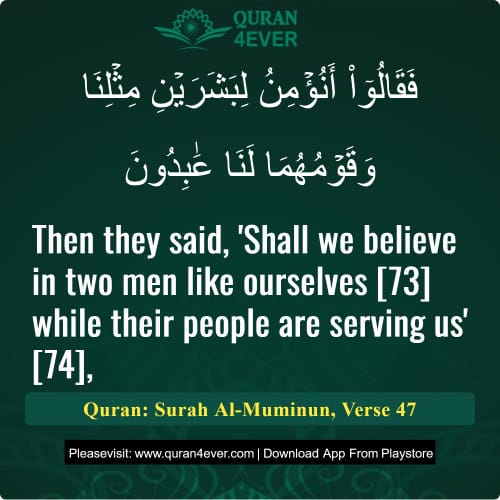
Transliteration:( Faqaaloo annu'minu libasharaini mislinaa wa qawmuhumaa lanaa 'aabidoon )
"Then they said, 'Shall we believe in two men like ourselves [73] while their people are serving us [74]?"
The disbelievers showed their flawed logic by refusing to believe in Musa and Haroon (عليهما السلام) simply because they were human beings like themselves—despite having believed in Pharaoh, who was also human, as a god. This shows that equality with a Prophet in appearance can blind people from recognising his true spiritual status. Therefore, faith begins with deep love and reverence for the Prophet, which leads to true fear of Allah.
Their worldly dominance over the Israelites further led them to reject the message. They mistook the humble condition of the believers as proof that they were on falsehood and that their own path was right. Hence, we are taught to always pray:
“O our Lord, make us not a test for the unjust people” (Surah Yunus, 10:85)—so that our weakness does not become a reason for others to go astray.
The tafsir of Surah Al-Muminun verse 47 by Ibn Kathir is unavailable here.
Please refer to Surah Muminun ayat 45 which provides the complete commentary from verse 45 through 49.
(23:47) They said: “Shall we put faith in two mortals like ourselves40a when their people are slaves to us?”[41]
40. The words in the text may either mean: (1) They were highly arrogant and tyrannous people, or (2) They showed haughtiness and self conceit.
40a For explanation, see (Surah Al-Muminun, ayat 24) note 26.
41. Abid is worshiper. According to the Arabic usage, to be a worshiper and a bondsman are almost synonymous. Therefore when the Prophets invited their people to worship Allah alone, they wanted them to worship and serve and obey none but Allah, and that is the real significance of the word ibadat. For further explanation, see (Surah Al-Kahf, ayat 52) note 50.

For a faster and smoother experience,
install our mobile app now.
Related Ayat(Verses)/Topics